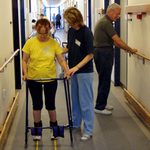In a significant proportion of the cases, patients need to live with MS for decades, therefore the quality of their life is very important. Active treatments and modern therapies are crucial in controlling the disease for the longest period possible, but the importance of rehabilitation improving everyday life between treatments should also be emphasized. One [&hellip
 In a significant proportion of the cases, patients need to live with MS for decades, therefore the quality of their life is very important. Active treatments and modern therapies are crucial in controlling the disease for the longest period possible, but the importance of rehabilitation improving everyday life between treatments should also be emphasized. One of the most significant deficiencies in Hungary is inherent in (the lack of) rehabilitation options; that is why one of the key objectives of the Foundation ever since its establishment has been to seek and find as many such options as possible for the patients; this commitment was also specified in the Deed of Foundation.
In a significant proportion of the cases, patients need to live with MS for decades, therefore the quality of their life is very important. Active treatments and modern therapies are crucial in controlling the disease for the longest period possible, but the importance of rehabilitation improving everyday life between treatments should also be emphasized. One of the most significant deficiencies in Hungary is inherent in (the lack of) rehabilitation options; that is why one of the key objectives of the Foundation ever since its establishment has been to seek and find as many such options as possible for the patients; this commitment was also specified in the Deed of Foundation.
There were a number of reconciliations undertaken with the National Health Insurance Fund and with the Ministry of Health. In 2002, in the social debate of the Béla Johan National Program in the Decade of Health, the Foundation indicated that in the spirit of equal rights, it was important to declare the requirements for improving the quality of life of incurable patients, of rehabilitation and of ensuring the consequences of attending patients at home. However, this has not yet been resolved, therefore the Foundation strives to improve the situation through supporters and by applying for funds.
The biggest achievement is that the Nyíregyháza MS Centre could be established and is being operated continuously from 2006; the centre is still the only institution specifically tailored for the needs of MS patients. The Foundation also concluded Co-operation Agreements with health service providers, in order that they would be ready to receive MS patients, who represent a special challenge, in addition to locomotor rehabilitation. As of 2008, this task has been undertaken by the Veresegyház Mission Health Centre and the Gyula Crystal Rehabilitation Institute.
Furthermore, through applying for funds and involving partners, the non-governmental organization also tries to help as many as possible find rehabilitation jobs. At the same time, this issue still suffers major deficiencies on a domestic level.
The Foundation has ensured the availability of different health care accessories for many patients, and a significant proportion of patients has managed to take part in shorter or longer health resort visits a number of times last year, where participation was again financed by the Foundation.







